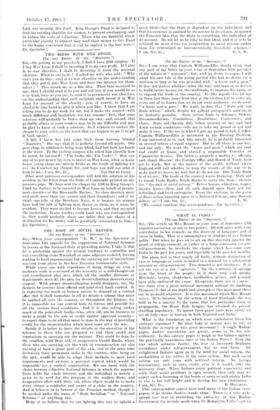T1112 BOOT OF SOCIAL REFORM.
[To 7UE EDITO1 OF THE " SPECTATOR."' SIII,—Whet your correspondent " L. W." in the Spectator of September 11th appeals for the suppression of National Schemes in favour of the National Ditty of providing means, I lake it that he is protesting against the present tendency to centralize and run everything from Whitehall or some adjacent es-hotel, leaving nothing to lucid organizations but the carrying out of instructions received front above in the best Prussian bureaucratic style. While every one wills experience of doing things On even a moderate scale is convinced of the necessity of ti well-thought-out and co-ordineted plan into which all the smaller divisions or departments must fit, the plea for decent ralieation deserves every support. With proper decent radiation would disappear, too, the
dangers Ile foresees f official and joint-stock bank control. It is expecting. too much of human nature to demand of a central office that it shall formulate in 1111 its details a scheme that must be applied all over the country, o• throughout the Empire, for it is impossible for one central body to foresee and provide for all the venous local conditions. And it is also asking rather much of the joint-stock hanks—who, after all, are in business to make a profit by the sale of credit against approved security— to expect them to do all that must be done in the way of providing credit for the reconstruction which must come after the war. Surely it is better to leave the details of the execution of the schemes to those who are prepared to risk their credit and reputations in carrying out the reforms. This could he done by the creation, with State OM, of co-operative Credit Bunks, where those who are carrying out the work of reconstruction are also • rucning at least a great part of the tisk, and at the same time incrensing their permanent stake in the country; who, being on Iho Spot, would he able to adapt their methods to meet local requirements and exercise a personal control which would be impossible for a central organization. We are faced with the choice between collective National Schemes in which the supremo Stale holds the whole interest. and the individual is merely o pawn to be wed for the purposes of the soulless State, and co-operative effort with State aid, whose object would be to make every citizen a capitalist and owner of a stake in the country. And it behoves its to beware of the Prussian method, though it be masked under the name of " State Socialism " or "National Schemes " or anything else.
Many of as beliere that we are fighting this war to uphold a
great ideal—that the State is dependent on the individual, and that its existence is justilied by its service to its citizen, as against the Prussian idea that the State is everything, the individual of no account. Do not let as be false to that ideul, and if it is to be retained we must strive for co-operation in social reform rather titan for centralized or bureaucratically Socialist ie schemes.—


































 Previous page
Previous page